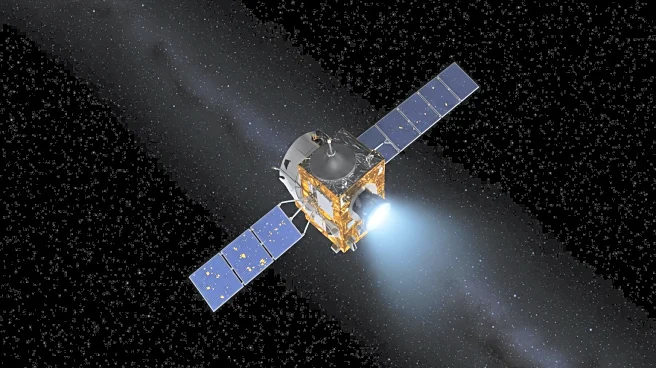What is the story about?
What's Happening?
The Trump administration has instructed NASA to prepare plans for terminating two satellite missions that monitor carbon dioxide and plant health. These missions, known as the Orbiting Carbon Observatories, provide critical data used by scientists, oil and gas companies, and farmers. The administration's rationale for ending these missions remains unclear, despite their proven value and longevity. NASA employees have been asked to develop Phase F plans, which outline options for terminating missions. The standalone satellite would burn up in the atmosphere if the termination plans are executed. Congress has funded these missions through the end of the 2025 fiscal year, but it is uncertain if funding will continue. NASA is considering proposals from private entities to maintain the device attached to the International Space Station.
Why It's Important?
The potential termination of these satellite missions could significantly impact climate science and agricultural forecasting. The data collected by these satellites is crucial for understanding carbon dioxide levels and plant growth globally. This information aids in predicting crop yields, drought conditions, and even political instability due to climate-related migration. Ending these missions could impair the ability to forecast and respond to severe weather and climate disasters, as highlighted by congressional Democrats. The move raises concerns about the prioritization of climate monitoring in federal budgets and the potential shift towards privatization of scientific missions.
What's Next?
Congressional Democrats have expressed opposition to the termination plans, arguing that the administration is overstepping by directing NASA to stop spending money already appropriated by Congress. The future of these missions depends on whether Congress will continue funding them in the next fiscal year. NASA's call for private companies and universities to take over the maintenance of the satellite devices suggests a possible shift towards privatization. This could lead to new partnerships but also raises questions about the role of public funding in supporting essential Earth observation missions.
Beyond the Headlines
The termination of these missions could have long-term implications for climate science and national security. The data from these satellites has revolutionized the understanding of carbon dioxide absorption patterns, challenging previous assumptions about tropical forests. The cost of maintaining these missions is relatively low compared to the initial investment, making their termination economically questionable. Privatization of NASA missions could alter the landscape of climate monitoring, with private sector involvement potentially increasing but relying on foundational public investment.
















